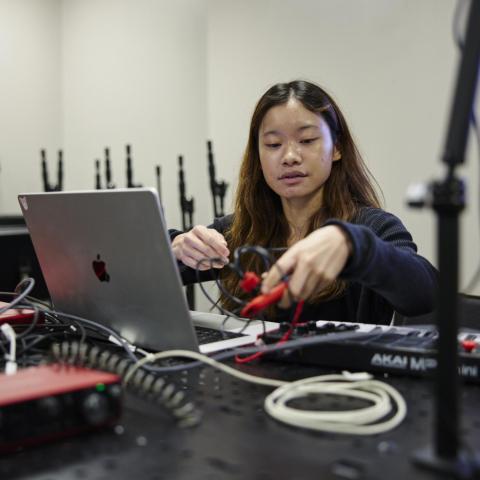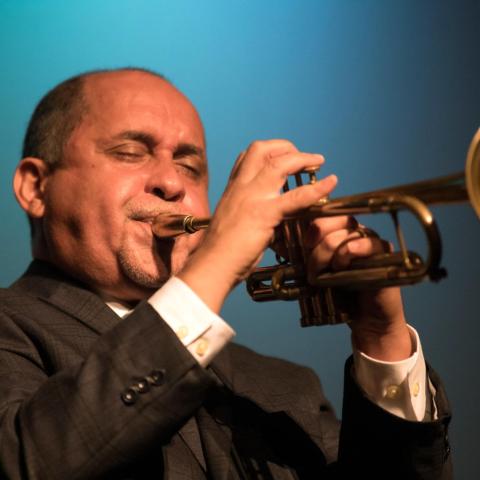Student Spotlight: Caio Miguel Jiacomini
What’s it like to study at Berklee? Our Student Spotlight series asks current students all about their Berklee experience—what they’re learning in class, what kinds of projects they’re involved in onstage or behind the scenes, how they recharge, and of course, what they’re listening to. This week, get to know Caio Miguel Jiacomini, a tenth-semester composer and producer from São Paulo, Brazil, who's dual majoring in screen scoring and music production and engineering.

Caio Jiacomini
Tell us about your path to Berklee. What made you decide to come here?
The main thing that attracted me to Berklee is the variety of musical styles and fields of study the college embraces. Most music colleges back home in Brazil are very restricted academically to a single area, with most of them being either strictly about classical music or strictly about jazz and Brazilian music. As a teenager I already knew I had a broad umbrella of interests: I was playing guitar and writing songs in a rock band, writing my own orchestral music, studying classical piano, and getting started with music production. I also knew I wanted to work doing music and audio for video games, and education in that field is pretty much nonexistent in Brazilian universities. So Berklee turned out to be the perfect home for me with the musical diversity the college fosters, paired with an outlook for the future with regards to new media and new technologies.
What's been your favorite class so far, and what has it taught you?
All the video game scoring classes I took with Gina Zdanowicz are tied as my favorite class so far. Gina is an incredible professor committed to fostering an open and inclusive learning setting, giving students plenty of freedom to pursue their own curiosity when working on class projects.
What's a project you've worked on since coming to Berklee that you've been especially excited about?
The most meaningful project I’ve worked on so far was a video game called A Taste of the Past developed by Sondering Studio, in which I worked on as a sound designer and composer. The game is a narrative sidescroller that follows the journey of Mei, a Chinese-American high schooler, after she wakes up in a train to the afterlife, where she gets to reconnect with her late mother through cooking.
We released it earlier this year and the results were better than anything we wished for: we’ve had over 30 thousand downloads in less than a month after release and a flood of comments telling us how emotionally potent the game was. We also got featured in this year's Game Devs of Color Expo as well as some other cool gaming outlets! It’s available for free on Steam and Itch.io.
How do you typically recharge or find new ideas outside of class?
I love museums, so when I got here and found out we have free access to the Museum of Fine Arts, it quickly became my favorite spot to chill and decompress by roaming its galleries and during warmer days, the MFA lawn becomes the perfect reading spot.
What careers are you interested in pursuing in the future?
I absolutely love working in game audio. Video games can provide some of the most raw and unique emotional experiences due to the interactivity of the medium, and in recent years I found out that I love working at the intersection between creativity and technology that games provide.
When you think towards your own future, who inspires you most?
All the professors and mentors in game audio who helped me get to where I am today. Game audio is such a deep and technical field, it’s very hard to find your footing in it without help from someone experienced. I hope that one day I can offer the same guidance to others as they have offered me.
What's one piece of advice you'd give to your high school self?
During the FIFA World Cup 2014 semifinals, Brazil will lose to Germany by 7-1. If you convince your parents to bet all of their savings on this result, you will likely be able to afford tuition without a sweat.
Caio's Favorite Game Score Tracks
1. "Too Late to Love You," Ben Babbit and Junebug, from Kentucky Route Zero
Kentucky Route Zero is one of the most evocative pieces of storytelling I’ve ever experienced, and a big part of that is the hauntingly ethereal soundscape and soundtrack created by Ben Babbitt. The sequence where “Too Late To Love You” plays is one of the most beautiful things I’ve seen in a video game.
2. "{EDGE OF THE FUTURE}," Hitoshi Sakimoto, Yoshimi Kudo, Mitsuhiro Kaneda, Rikako Watanabe, Yukinori Kikuchi, Kazuki Higashihara, Azusa Chiba, from 13 Sentinels: Aegis Rim
13 Sentinels: Aegis Rim is a tour de force of interactive storytelling—if you’re into mecha anime and visual novels at all, this is a must play. "{EDGE OF THE FUTURE}" is the cue that plays during the final battle of the game and it’s basically a climactic rearrangement of the main menu theme, and there’s nothing more epic than that.
3. "Lament of Orpheus," Darren Korb, from Hades
Darren Korb is one of the most unique songwriters in general, but definitely the most unique one working in games in my opinion. "Lament of Orpheus" is a favorite from him.
4. "Hidden in Logic," Thammaz Kauffman, from Dandara
Dandara is my favorite Brazilian game ever, with some really clever and fresh spins on the metroidvania genre. The OST [original soundtrack] composed by Thommaz Kauffman combines traditional Brazilian and West African instruments with electronic textures in a really unique way.
5. "Rotating Room," Martin Stig Anderson, from Limbo
The eerie soundscape of Limbo is one of the rawest things I’ve ever experienced in a video game. Martin Stig Andersen masterfully blurs the diegesis of the soundscape by morphing music into sound design to deliver an emotional punch in the gut.




